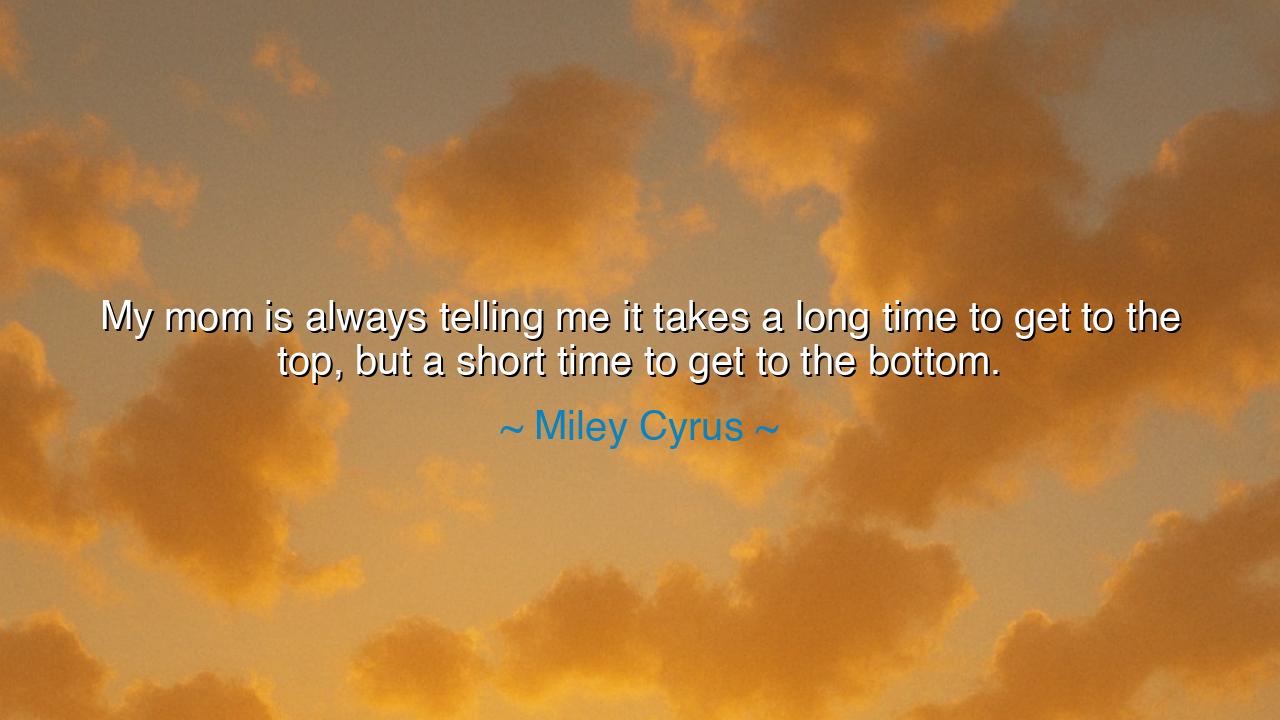
My mom is always telling me it takes a long time to get to the
My mom is always telling me it takes a long time to get to the top, but a short time to get to the bottom.






When Miley Cyrus said, “My mom is always telling me it takes a long time to get to the top, but a short time to get to the bottom,” she echoed a truth as ancient as ambition itself — that success is slow to build and quick to lose. Her mother’s words carry the quiet authority of experience, the voice of someone who understands that fame, fortune, and achievement are fragile when not grounded in humility and discipline. Beneath the simplicity of the phrase lies a universal warning: the higher one climbs, the more careful one must become, for the fall is always faster than the ascent.
The ancients spoke often of this balance between rise and ruin. In Greek myth, the story of Icarus warns of the same danger. Given wings of wax and feather, Icarus soared higher and higher, intoxicated by his own freedom, until he flew too close to the sun — and fell. His fall was not due to fate, but to forgetfulness — he forgot the laws of nature, the patience of his father, and the humility that must accompany every ascent. Miley’s mother, in her wisdom, passes down the same lesson: to rise is not only to dream, but to remember — to remain anchored even as one ascends toward light.
Her words also speak to the fragile nature of reputation and trust. It may take years of effort, sacrifice, and consistency to build something meaningful — whether a career, a name, or a relationship — but only one careless moment to destroy it. The ancients called this the Law of Virtue, the principle that character, not circumstance, determines the endurance of success. True greatness requires not only ambition but also endurance — the daily labor of humility, restraint, and gratitude. For it is not the height of the mountain that tests a person’s strength, but the steadiness of their footing upon it.
We see this truth written throughout history. Consider Napoleon Bonaparte, who rose from obscurity to become one of the most powerful men in Europe. His rise took decades of strategy, study, and mastery of leadership. Yet his downfall came swiftly — undone by pride, impatience, and the inability to know when enough was enough. Like the wisdom in Miley’s mother’s words, his life stands as a monument to the law of balance: that power, when not tempered by humility, consumes itself.
At its heart, this quote also reflects the tender bond between parent and child, and the role of wisdom passed down through generations. A mother does not speak to restrain her child’s dreams but to fortify them — to remind her of the weight that comes with the heights she seeks. In Miley’s case, her mother’s voice is a compass in the glittering chaos of fame, a reminder that success is not a sprint toward glory but a lifelong walk upon uncertain ground. It is love disguised as caution, a warning born not of fear but of care.
There is beauty, too, in the dual nature of the lesson — it is not a call to fear the fall, but to honor the climb. To take a long time to reach the top is not a burden; it is a blessing. For in every step, every mistake, every moment of struggle, the soul is strengthened. What comes quickly often departs the same way, but what is earned slowly endures. The ancients would say: the mountain gives its view only to those who respect its weight.
So, the teaching for future generations is this: build slowly, guard humbly, and live wisely. Do not rush your rise, for the pace of your ascent determines the strength of your foundation. Be patient with growth, diligent with integrity, and mindful of pride. When you reach your summit — whatever that may be — remember the voice that warned you: it is easier to fall than to climb. And if ever you stumble, do not despair. Begin again, slowly and faithfully, for true greatness lies not in never falling, but in always choosing to rise once more.






AAdministratorAdministrator
Welcome, honored guests. Please leave a comment, we will respond soon